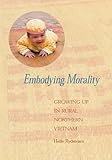Embodying Morality : Growing Up in Rural Northern Vietnam / Helle Rydstrom.
Material type: TextPublisher: Honolulu : University of Hawaii Press, [2003]Copyright date: ©2003Description: 1 online resource (256 p.)Content type:
TextPublisher: Honolulu : University of Hawaii Press, [2003]Copyright date: ©2003Description: 1 online resource (256 p.)Content type: - 9780824825249
- 9780824862336
- 305.23095971734 22
- online - DeGruyter
- Issued also in print.
| Item type | Current library | Call number | URL | Status | Notes | Barcode | |
|---|---|---|---|---|---|---|---|
 eBook
eBook
|
Biblioteca "Angelicum" Pont. Univ. S.Tommaso d'Aquino Nuvola online | online - DeGruyter (Browse shelf(Opens below)) | Online access | Not for loan (Accesso limitato) | Accesso per gli utenti autorizzati / Access for authorized users | (dgr)9780824862336 |
Frontmatter -- Contents -- Preface and Acknowledgments -- Note on Transcription -- Chapter 1. First Morality, Then Knowledge -- Chapter 2. Situating Bodies -- Chapter 3. Female Morality -- Chapter 4. Practicing Tinh Cam -- Chapter 5. Corporeal Honor -- Chapter 6. Learning Morality in School -- Chapter 7. Body Styles -- Chapter 8. Conclusions -- Notes -- Glossary -- Bibliography -- Index -- About the Author
restricted access online access with authorization star
http://purl.org/coar/access_right/c_16ec
One of the first anthropological studies based on extensive fieldwork in Vietnam in decades, Embodying Morality examines child-rearing in a rural Red River delta commune. It is a sophisticated and intriguing exploration of the ways in which a family system based on principles of male descent influences the moral upbringing and learning of girls and boys. In Vietnamese culture boys alone perpetuate the patrilineal family line; they incorporate the past, present, and future morality, honor, and reputation of their father's lineage. Within this patrilineal universe, girls are viewed as blank sheets of paper and must compensate for this deficiency by embodying tinh cam (sensitivity, sense). Such attitudes play a significant role in the upbringing of girls and boys and in how they learn to use and understand their bodies. Helle Rydstrøm offers fresh data--from audiotapes, videotapes, textbooks, observations in the home and at school--for identifying the transformation of local and educational constructions of females, males, and morality into body styles of girls, boys, women, and men. She highlights the extent to which body performances in daily life produce, reproduce, and challenge widespread northern Vietnamese ideals of femininity and masculinity. The author's highly original application of post-structuralist theory to Vietnam blends epistemology, practice, body, and socialization theories with feminist analysis and relates these to children's learning. By proposing the body as an analytic category that can move feminist theory beyond the impasse of the well-established opposition between sex and gender, Embodying Morality demonstrates vividly how specific cultural elaborations of corporeality are learned, lived, and experienced in contemporary rural Vietnam.
Issued also in print.
Mode of access: Internet via World Wide Web.
In English.
Description based on online resource; title from PDF title page (publisher's Web site, viewed 02. Mrz 2022)


